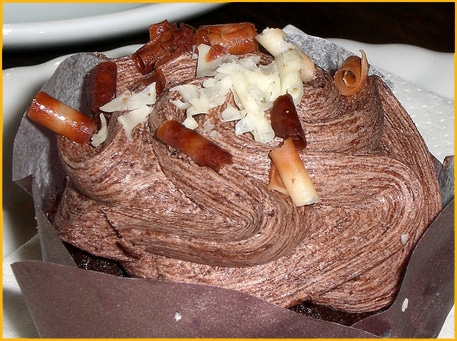
Although “7 Worst Supermarket Rip-Offs” was first published by Men’s Health, authors David Zinczenko and Matt Goulding make it clear that they are passing along wisdom found in Eat This, Not That! Supermarket Survival Guide and Cook This, Not That! What wisdom might that be? The lowdown on a popular snack and an energy drink, as well as certain organic vegetables, a certain species of fish, and a much admired cut of beef. (To digress for a moment, but not really, Esquire magazine offers its readers many tongue-in-cheek tips for coping with life, including this one in the April 2009 issue:)
Rule No. 325: You can do a lot for your diet by eliminating foods that have mascots.
The authors “7 Worst Supermarket Rip-Offs” expand on the theme of cartoon mascots in their very humorous concluding paragraph. In fact, the list contains a lot of chuckles, but it’s not all fun and games. On the subject of the hype surrounding gluten-free foodstuffs, they say,
A 2006 study published in the American Journal of Gastroenterology followed a group of gluten-free dieters with celiac disease for 2 years and discovered that 81 percent of them actually gained weight.
Apparently, the avoidance of gluten will not help a sufferer from celiac disease to lose weight. Fortunately, only a very small percentage of people — less than 1% — have this condition. But… what about people who are addicted to gluten? Obviously, the breaking of any addiction that contributes to obesity can be a powerful step toward attaining healthier weight. In the case of gluten, the mechanism is complicated.
Addiction to gluten is not an unfamiliar topic to those who look for the causes of obesity. Much of the information is anecdotal, meaning it comes from actual real people who are struggling with this problem. This is not surprising, because the medical establishment is strangely silent about food addiction, whether the problem food is chocolate, soda pop, or breakfast cereal full of gluten.
Sheron Smith, for instance, talks freely about her history of morbid obesity. When she hit 300 pounds, an instinct for self-preservation kicked in and she got serious about regular exercise, which helps the body in at least 14 different ways.
Smith’s particular addictions were many, starting with soda pop. After that one was conquered, she moved on to exploring the role of gluten in the problematic life of a food addict. She refers us to an article published by Insulite Laboratories, who are “Dedicated to reversing insulin resistance — an underlying cause of excess weight/obesity.” The author is not credited, although the site lists an extensive medical and advisory board. The article begins with a strong and rather shocking assertion:
Many food ‘addicts’ are right to suspect there is a physical reason that makes them crave carbohydrates and put weight on easily. But the underlying cause of their struggles often goes undiagnosed and untreated by the medical profession… As many as 75% of overweight and obese people in the U.S. may be addicted through poor eating habits to either carbohydrates or the protein called gluten, which is found in all wheat, rye, barley and oat products.
The reason this number is so high is not only the profusion of hyperpalatable, hedonic foods that contain gluten, but the tendency of other substances to trigger intense cravings for carbohydrates, these being sugar substitutes, alcohol, and MSG. The piece goes on to discuss insulin resistance and carbohydrate addiction in great detail.
Kristján Már Gunnarsson begins an article titled “Junk food causes addiction in the brain” by quoting the American Society of Addiction Medicine’s definition of addiction, before going on to state that junk food acts in the brain to cause addiction just like narcotic drugs. In a paragraph that is reminiscent of Dr. Pretlow, Gunnarsson says,
This person will most likely end up obese, with type II diabetes and raving metabolic syndrome, and die from something like heart disease. The person knew that it was the unhealthy diet and lifestyle that was causing all of this, yet was unable to summon the willpower to take control. Is it really that hard to believe that this person is in fact addicted to junk food?
And then he explains the chemistry of gluten addiction, which includes opioid peptides, which also appear in the addiction to heroin and its derivatives. It’s well worth reading. And let’s include one more quotation from this Icelandic medical student:
I am certain that conventional wisdom has made a lot of errors in the past on healthy living, and I think these errors have not yet been rectified.
Your responses and feedback are welcome!
Source: “7 Worst Supermarket Rip-Offs,” Yahoo! Health, 03/04/11
Source: “About Me,” Next Level Weight Loss Support
Source: “Addiction to Carbohydrates and Gluten Often Underlies Excess Weight and Obesity,” InsuliteLabs.com
Source: “Junk food causes addiction in the brain,” Kris Health Blog, 03/25/11
Image by seelenstrum, used under its Creative Commons license.

 FAQs and Media Requests:
FAQs and Media Requests: 











